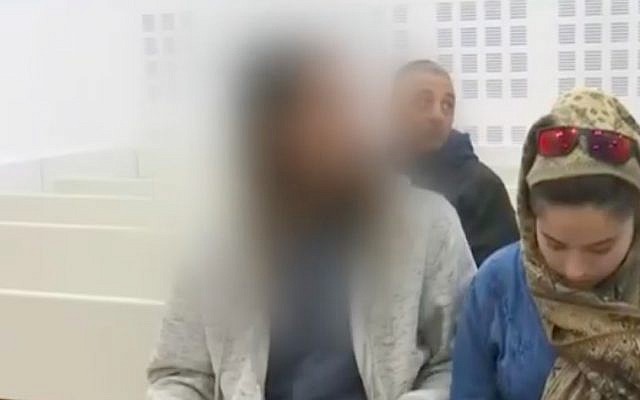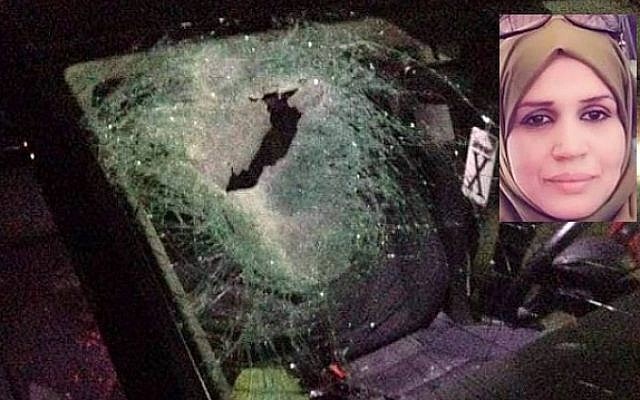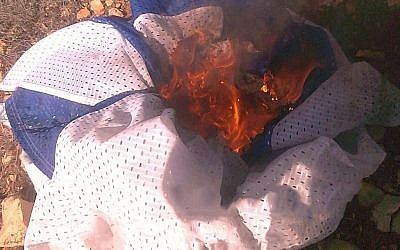Manslaughter accusations against 16-year-old say he hurled 2-kg rock that caused death of Aisha Rabi ‘out of an ideological motive of racism and hostility toward Arabs everywhere’

The Central District Attorney’s Office filed an indictment Thursday against the Israeli teen suspected of killing a Palestinian woman three months ago, in the most deadly incident of suspected Jewish terror since the 2015 firebombing of a Palestinian home in Duma.
The 16-year-old from the central West Bank was charged with manslaughter, aggravated stone throwing at a moving vehicle and intentional sabotage of a vehicle. Each of the charges connected to the killing of Aisha Rabi, a 47-year-old Palestinian mother of eight, was qualified as having been carried out “in the context of a terrorist act.”
The suspect could face considerable jail time as a manslaughter conviction alone carries a maximum sentence of 20 years behind bars. However, he avoided murder charges which would have put him at risk for life in prison.
In filing the indictment, the State Prosecutor’s Office requested that the suspect be held until the completion of proceedings against him.
According to the charge sheet, the suspect — whose name is barred from publication due to the fact that he is a minor — departed from the Pri Haaretz yeshiva in the northern West Bank Rehelim settlement, where he is a student, accompanied by several other students late on the evening of October 12.
The group arrived at a hilltop between the Rehelim Junction and the Tapuah Junction, overlooking Route 60 — the West Bank’s main north-south artery. The suspect then grabbed a large stone weighing roughly two kilograms (4.4 pounds) and prepared to hurl it at a Palestinian vehicle, “out of an ideological motive of racism and hostility toward Arabs everywhere,” the indictment states.
At the same time Rabi, her husband and their nine-year-old daughter were traveling from the Rehelim Junction toward the Tapuah Junction on their way home to the village of Biddya.
According to the indictment, at this point the suspect — identifying the Palestinian plates — hurled the large stone at the vehicle, which was traveling at a speed of roughly 100 kilometers per hour (60 mph). It smashed through the windshield of the passenger side and struck the woman in the head. Rabi’s husband managed to maintain control of the vehicle, calm his panicking daughter and speed to a nearby Nablus clinic where his wife was pronounced dead shortly thereafter.
In the days following the attack, a strict gag order was placed on the investigation jointly conducted by the Shin Bet security service and the police’s nationalistic crimes unit. Nonetheless, defense officials told Israeli media that they believed young Israeli settlers were responsible for the stone throwing.
On December 30 — nearly two-and-a-half months after Rabi’s death — police carried out the first string of arrests in the case, nabbing three Israeli teenagers suspected of involvement. A week later two more of their peers were detained.
The Shin Bet then partially lifted the gag order on January 7 to announced that the five boys were suspects in Rabi’s killing and revealed that they were all students at Rehelim’s Pri Haaretz religious boarding school.
All five suspects were, for a time, deprived of the right to meet with their attorneys, though they were later granted counsel visits. Israeli law allows authorities to delay an attorney visit for a terrorism suspect by up to 21 days, subject to court appeal.

Israeli investigations into Jewish terrorism — as such cases are often referred to — are highly sensitive. Left-wing activists have accused authorities of dragging their feet in such cases in comparison to investigations into Palestinian attacks, while leaders of the settlement movement and national religious camp have accused the Shin Bet of using torture in their questioning of young Jewish suspects.
As criticism against Israeli investigators increased, the Shin Bet began partially lifting the gag order in order to release details of the investigation that “indicate the extreme anti-Zionist characteristics” of the teenagers it arrested.
One piece of evidence included a video uncovered during the investigation that depicts the burning of an Israeli flag. A second item the Shin Bet said its agents found in the room of a suspect was an Israeli flag with a swastika drawn over the Star of David along with the phrase, “Death to Zionists” daubed at the top.

Nonetheless, the court released four of the five suspects on January 10, in what the minors’ attorneys claimed signaled a crumbling of the investigation against them.
A week later, the prosecution announced that it intended to indict the prime suspect “in the coming days.”
The court at the time acknowledged that the evidence against the minor was “severe” and agreed to once again extend his remand in the meantime.
On Wednesday, Judge Guy Avnon revealed that the evidence was a DNA sample belonging to the suspect that was found on the stone that struck Rabi in the head.
The teenager’s attorney downplayed the findings, saying that if prosecutors had enough on his client, they would have indicted him immediately rather than requesting five remand extensions in order to complete the investigation.
The teen’s father called the indictment an “injustice” and said the family knows “our son is innocent.” He expressed confidence that the boy would be acquitted.
As reported by The Times of Israel
